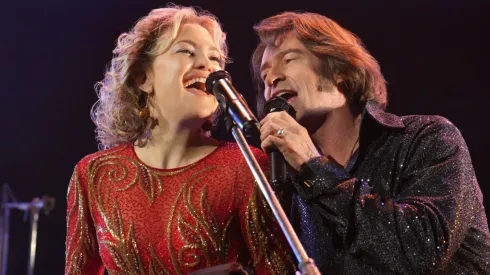Even before its release, “Song Sung Blue” has already started to hum through the cultural conversation — a musical poised to blend the grandeur of Hollywood with the quiet ache of human longing.
Directed by Olivia Newman and starring Hugh Jackman and Kate Hudson, the upcoming Neil Diamond biopic promises not just a retelling, but a reinvention of the musical drama for a new generation, shimmering somewhere between nostalgia and revelation.
As anticipation builds for its Christmas 2025 debut, the film joins a lineage of dramatic musicals that have defined the modern era — stories where melody meets melancholy and performance becomes confession. These works remind us that music on screen can still pulse with truth, transforming stage emotions into cinematic legacy.
Les Miserables (2012)
This film is the modern benchmark for dramatic musicals, fully embracing the raw, often agonizing emotionality of its source material. Directed by Tom Hooper, the adaptation required its A-list cast—including Hugh Jackman, Anne Hathaway, and Russell Crowe—to sing live on set, injecting a palpable sense of immediacy and pain into the epic narrative of poverty, revolution, and unrequited love. Its devotion to the gritty realism of 19th-century France makes its tragic themes profoundly affecting.
Chicago (2002)
Rob Marshall’s Oscar-winning film redefined the modern screen musical by using its music not as reality, but as psychological fantasy. The musical numbers occur only in the minds of the characters, acting as stylish, biting manifestations of their ambition, fame, and deceit within the cynical world of 1920s jazz and crime. This ingenious approach created a sophisticated, dark commentary on celebrity culture that remains intensely sharp and relevant.
A Star Is Born (2018)
This film succeeded as an explosive dramatic vehicle, using its original music to chart the tragic arc of addiction and artistic decline. The intensity of the performances by Lady Gaga and Bradley Cooper made the film feel less like a traditional musical and more like a raw, emotional exposé. The songs were inseparable from the characters’ emotional states, providing a visceral language for their rise, fall, and ultimately, their heartbreak.
Cabaret (1972)
Set against the suffocating political backdrop of Weimar Berlin on the brink of Nazism, Cabaret uses its musical numbers to provide dark, cynical commentary on the surrounding political and social decay. Liza Minnelli’s iconic performance anchors the drama, as the club acts become increasingly sinister. It is a masterpiece of its kind, using the glamorous artifice of the stage to highlight the terrifying reality of rising fascism.
West Side Story (1961/2021)
Both the original film and Steven Spielberg’s recent adaptation stand as definitive examples of musical tragedy. The music is used to propel a narrative rooted in intense social conflict—gang rivalry, poverty, and prejudice—that culminates in inevitable, heartbreaking violence. The soaring melodies contrast sharply with the grim urban realism, creating a potent, timeless narrative about the human cost of hate.
Dreamgirls (2006)
This film captured the turbulent, often ruthless rise of R&B music, framing its songs as weapons in a fierce battle for fame, control, and authenticity. The drama focuses on the backstabbing, emotional manipulation, and racial tensions within the music industry. The film’s explosive vocal performances are fueled by the intense, non-musical conflict between the characters, making it a compelling study of ambition and betrayal.
Evita (1996)
Alan Parker’s highly ambitious film adapted the complex political life of Eva Perón, using a through-sung format that treats every song as a crucial piece of dramatic narrative and political statement. Madonna and Antonio Banderas drive the tragic exploration of power, poverty, and celebrity in 1940s Argentina. Its grand scale successfully transforms a true historical story into a compelling, emotionally exhaustive musical epic.
Sweeney Todd: The Demon Barber of Fleet Street (2007)
Tim Burton’s gothic adaptation of the Sondheim musical is a unique fusion of horror and dramatic musical. The songs serve a psychological function, driving the protagonist’s profound madness and obsessive need for revenge. The film uses its stylized, dark aesthetic and relentless, blood-soaked musical numbers to explore themes of profound injustice and the ultimate cost of unchecked rage.
Fiddler on the Roof (1971)
This classic film is a profound dramatic piece that uses its music to explore themes of tradition, religious persecution, and social change. Set in a Jewish village in Tsarist Russia, the story centers on the quiet agony of a father watching his daughters challenge his deeply held customs amidst the looming threat of violent, anti-Semitic expulsion. The musical framework makes the emotional weight of their uncertain future intensely resonant.
The Greatest Showman (2017)
This film, starring Hugh Jackman, became a phenomenal global success by leveraging uplifting pop anthems to tell a heavily fictionalized rags-to-riches story. While critically divisive for its historical accuracy, its immense commercial appeal and emotionally charged soundtrack—including the anthem “This Is Me”—cemented its status as a cultural event and a defining modern musical success. The film excels at using its pop score to deliver a potent, feel-good message of self-acceptance and ambition.
